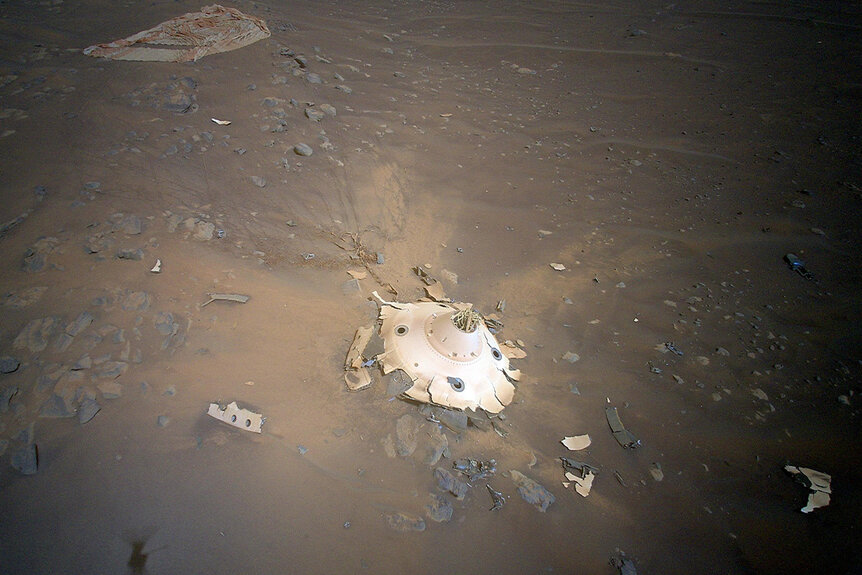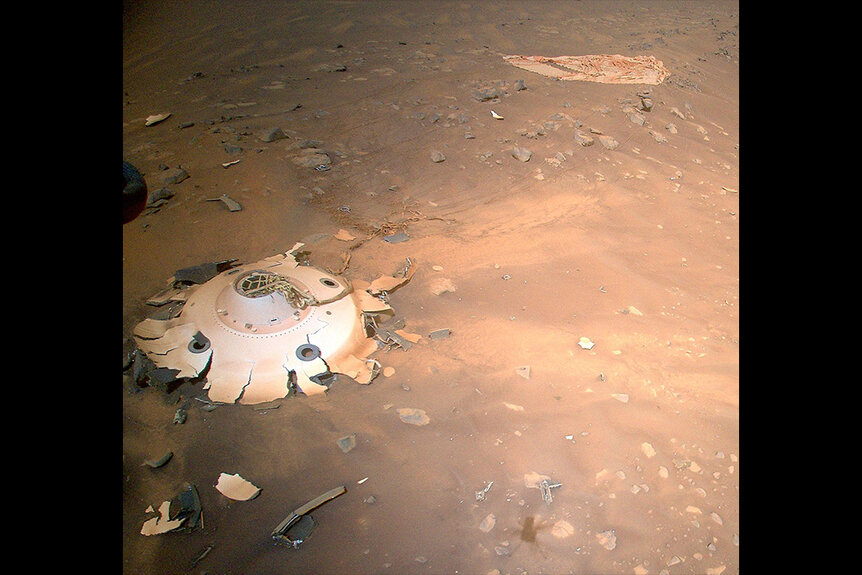Create a free profile to get unlimited access to exclusive videos, sweepstakes, and more!
NASA's Martian Helicopter Photographed Spaceship Wreckage on Mars
Aka space litter.
Whether we’re talking about real life or fiction, space travel is hard. When Harry Vanderspeigle (real name unpronounceable) visited our pale blue dot, a stray bolt of lightning brought down his craft and stranded him on Earth. Even the intelligent extraterrestrials of Resident Alien (streaming now on Peacock) couldn’t manage visiting another world without leaving a little wreckage.
If there’s any alien spacecraft wreckage on our planet, we haven’t found it (or it’s being hidden), but we have found the wreckage of an alien spacecraft on Mars, and the aliens are us. During the 26th flight of Ingenuity, NASA’s tiny Martian quadcopter, scientists snapped photos of shattered landing equipment, crashed into the Martian regolith.
Perseverance and Ingenuity Littered Mars with Wreckage
Ingenuity was looking at some of the landing equipment responsible for delivering it and the Perseverance rover safely to the ground. It was all part of the complicated Seven Minutes of Terror which began the rover’s time on the Red Planet.
RELATED: Video of Mars helicopter Ingenuity's 25th flight
It takes seven minutes to get from the top of the Martian atmosphere to the ground, but it takes at least twice that long for any signals to get from Mars to Earth. Everything that happens during descent and landing has to happen automatically, with no real-time human intervention.
When Perseverance first touched the atmosphere, it was moving between 12,000 and 13,000 miles per hour. The heat shield slammed into the thin alien air, heating up in the friction and slowing the craft down to a more manageable but still breakneck 1,000 miles per hour. Next, a supersonic parachute deployed, and the heat shield dropped, revealing instruments for mapping the ground beneath it. The parachute got it down to about 200 miles per hour, but the Martian air wasn’t thick enough to slow it down more than that. No longer useful, the parachute and the backshell it was anchored to were jettisoned. Retrorockets slowed the craft to a standstill, but they couldn’t touch the ground. Instead, they stopped about 20 meters above the ground, and a device called the Skycrane lowered the rover the rest of the way.
Then the crane blasted back off and crashed a safe distance away. Between the heat shield, the parachute and backshell, and the Skycrane, there is plenty of wreckage to go around.
Ingenuity Photographs Part of the Perseverance Landing Wreckage
It wasn’t a certainty that Ingenuity would even work on Mars, but it has quickly become one of the mission’s valuable elements. Not only is it endlessly cool to have a tiny helicopter bopping around on Mars – Ingenuity is, so far, the only craft to have ever achieved controlled flight on another world – but it also provides a novel point of view to the Martian landscape.
Ingenuity was initially planned to do only five flights, but it has performed so well that scientists have just kept going. At the time of writing, it has flown the red skies more than 60 times and counting. It was during one of those bonus flights that Ingenuity chased down some of its own wreckage and photographed the crime scene.
“NASA extended Ingenuity flight operations to perform pioneering flights such as this. Every time we’re airborne, Ingenuity covers new ground and offers a perspective no previous planetary mission could achieve. Mars Sample Return’s reconnaissance request is a perfect example of the utility of aerial platforms on Mars,” said Teddy Tzanetos, Ingenuity’s team lead at JPL, in a statement.
RELATED: See Mars’ Jezero Crater for yourself in this stunning video tour
The Mars Sample Return program team asked for the images in order to inform future landing missions. Any sample return mission requires landing on Mars and lifting back up again, so understanding the performance of previous landing equipment could inform the design of that and other future missions.
Ingenuity lifted off at 11:37 A.M. local Mars time and flew for 159 seconds. It rose to an altitude of about 8 meters (26 feet) and flew around the area snapping pictures from multiple angles. The images show both the supersonic parachute and the attached backshell. Scientists estimate the backshell smashed into the ground at 126 kilometers (78 miles) per hour. That’s fast and hard enough to cause some obvious damage, but the equipment is relatively unscathed. Engineers noted that the protective coating, parachute, and many of the suspension lines appear to be intact after both descent and crash-landing.
The potential engineering value of the images is difficult to quantify, but the value to humanity’s scrapbook of Cool Stuff is infinite. We are looking at part of a crashed spaceship on another planet, and we are the aliens responsible.
Granted, when aliens crash-land here, it rarely ends well. Catch the first two seasons of Resident Alien streaming now on Peacock.




































